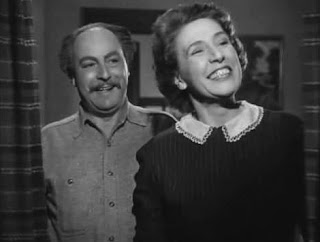Directed by Joseph H Lewis; produced by Ted Richmond
Inspector Henri Cassin (Steven Geray) is the best detective in the Paris Police, but hasn’t had a holiday in eleven years. When at last his superior, Commissar Grande (Gregory Gay), persuades him to take time off, he goes to the little village of St Margot, hoping for peace and quiet. What he gets, as seems customary with detectives wanting peace and quiet, is a crime spree. When the local head of gendarmerie (Louis Mercier) asks for his help, Cassin cannot refuse him.
So Dark the Night seems to fit neatly in the category shared by probably hundreds of other low-budget mystery movies of the late 1930s and the 1940s. The protagonist is thrust into a situation in which he must use his professional skills to ascertain the truth; he meets a pretty woman who leads to romance; the killer is unmasked in a highly dramatic fashion. Yet this film has at least one element that allows it to stand out.
Steven Geray was much better known as a character actor than a lead player, which he seems to have played in other movie than this. He does adequately in the rôle, though he is hardly charismatic and barely stands out among the rest of the cast, perhaps illustrating the reason why he was much better known as a character actor.
The other players range in quality: Gay is quite convincing, more natural than Geray, while Micheline Cheirel, as the love-interest, is not really an asset to the film. (As well, the difference in her character’s age and Cassin’s is made much of in the script; since Geray was not yet forty at the time (he could perhaps have passed for a few years older), and Cheirel was almost thirty (and looked it), it would have been better to have cast either an older male lead or a younger female counterpart.) Almost all of the actors are European (French, Russian, German, Austrian, Belgian) in this American movie.
The direction is a little above average, though it should have been better, coming from the director of pictures such as My Name is Julia Ross (reviewed in this blog in December of 2019), Gun Crazy and The Big Combo. However, in the case of the first-named film, the script and the acting were what made it good; Lewis’s contribution was workman-like, as it is in So Dark the Night. He would do better.
The script is unexciting. Its Parisian characters are more interesting than its rural, who come off as stock; there is even a village hunchback (who dresses like Quasimodo from The Hunchback of Notre Dame.) The setting is France, maybe due to Geray’s continental accent. (While contemporary, the Second World War, with its German occupation of France, just ended, is not mentioned.)
It is, then, the story that elevates So Dark the Night. While the set-up seems standard, the mystery deepens as the movie progresses, and while the viewer may deduce the killer’s identity, he may not figure out what the outcome of the revelation will be. Cassin’s determination to bring the murderer to justice becomes something almost unique in mystery movies, at least of the period.
For this originality, the movie, which is largely forgotten, should be remembered.







This is why I gave up reading chick lit fiction. When one story is the same as the last it becomes tiresome. It's a rare exception, like this film, when the formula is changed. Perhaps they need an Eli to spice things up.
ReplyDeleteApparently among film buffs, the movie *is* remembered. It's even been called a "cult classic" of its genre. Whatever its flaws may have been, it did have a pretty good twist at the end.
ReplyDelete